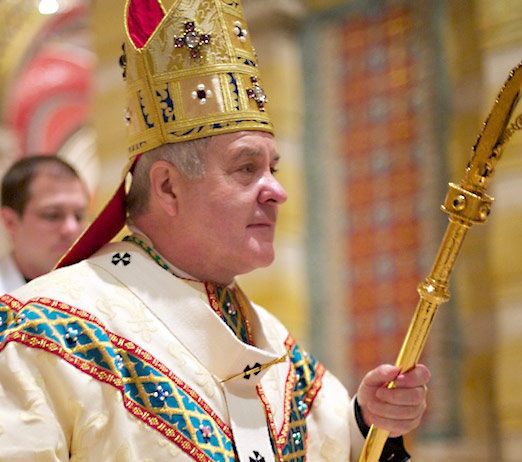
A battle of missions is brewing in St. Louis between the Catholic archdiocese and the Girl Scouts. The latest development is that Archbishop Robert Carlson has called on parishes to seek alternatives to Girl Scouts for supporting the 43,000 girls currently in Girl Scouts in the Eastern Missouri area. The archdiocese’s Catholic Youth Apostolate (CYA) has previously identified American Heritage Girls and Little Flower Girls Club as two alternatives. Carlson also announced that he is disbanding the Catholic Committee on Girl Scouts and creating a Catholic Committee for Girls Formation, reflecting the change in policy. There are no immediate plans to disassociate the archdiocese from Girl Scouts, but that is the apparent longer-term outcome based on events to date.
Carlson’s letter references the negotiations between CYA and the Girl Scouts of Eastern Missouri (GSEM) to address “ongoing concerns” about positions taken by Girl Scouts of the USA (GSUSA) and the World Association of Girl Scouts and Girl Guides (WAGGGS). The letter cites areas where Girl Scouting and Catholic teaching are at odds: sexual and reproductive rights, including for youth; the role of transgendered youth in Girl Scouting; and the use of legendary feminists Gloria Steinem and Betty Friedan as role models for girls. Although some accommodations have been made locally by GSEM, Carlson said, the overall strategic direction of Girl Scouting nationally, GSUSA’s support for WAGGGS, and remaining doctrinal issues make it advisable for churches to disassociate from Girl Scouts and seek alternatives. Carlson says in his letter:
Girl Scouts is exhibiting a troubling pattern of behavior and it is clear to me that as they move in the ways of the world it is becoming increasingly incompatible with our Catholic values. We must stop and ask ourselves—is Girl Scouts concerned with the total wellbeing of our young women? Does it do a good job forming the spiritual, emotional, and personal wellbeing of Catholic girls?
Sign up for our free newsletters
Subscribe to NPQ's newsletters to have our top stories delivered directly to your inbox.
By signing up, you agree to our privacy policy and terms of use, and to receive messages from NPQ and our partners.
For its part, GSUSA has information on “Girl Scouts and Faith” on its website, referring generally to faith but exclusively addressing Girl Scouts and the Catholic Church. The pages include links to documents on the U.S. Conference of Catholic Bishops’ website and examples of successful partnerships. Locally, GSEM has issued a response to Carlson’s letter on their web site. Called “The Truth of the Matter,” GSEM addresses concerns and links readers to other pages with more detailed information on GSEM. One of the few factual disputes (as opposed to differences in interpretation) centers on the distribution of cookie sale proceeds. GSEM says, “All proceeds (100 percent) from the Cookie Program stay within our local Council and support leadership development for girls.” However, the diocese’s web site links to a GSUSA FAQ on cookie sales that says, “On average, Girl Scout council net revenue is approximately 65–75 percent of the local retail price, and the amount that is shared with participating Girl Scout troops and groups, referred to as troop proceeds, is approximately 10–20 percent of the local retail price.”
Carlson’s actions in St. Louis may have broader implications. He is a past president and founder of the Catholic Youth Apostolate USA and serves on the U.S. Conference of Catholic Bishops’ Subcommittee on Youth and Young Adults. These efforts to replace Girl Scouting as a Catholic-sponsored activity in St. Louis may serve as a model elsewhere. This is important to GSUSA as well as to the estimated 500,000 Catholic girls currently involved in Girl Scouts throughout the United States.
As readers will remember, the issues of religious sponsorship of scouting came up loud and clear around the Boy Scouts’ policies related to admitting openly gay scouts and leaders. The subsequent decisions the BSA have made to allow gay scouts but not leaders have caused fallout in the ranks of religious congregations sponsoring troops, but not to the extent originally feared. It will be interesting to see the Girl Scouts’ further responses.—Michael Wyland











